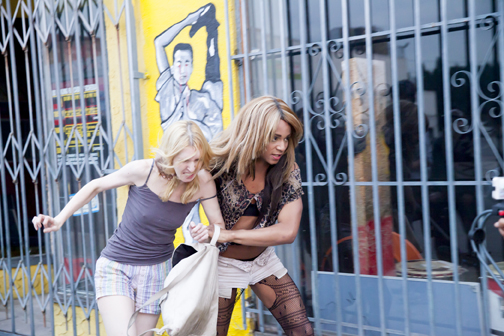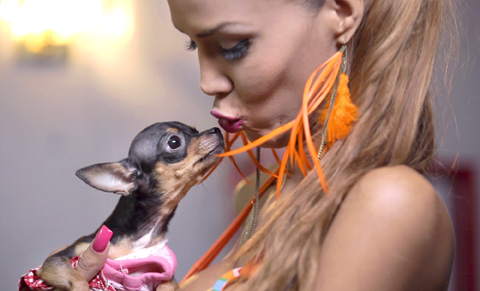Writer/director Sean Baker has made wonderful indie films that are sparkling gems of originality and fresh perspectives of characters not usually seen in movies, including Prince of Broadway (2010) and Starlet (2012). Unfortunately, Tangerine shows this flare for maybe 10 out of almost 90 minutes of nonstop stereotypes. That Baker and his co-cinematographer Radium Cheung shot the film using the close intimacy of the iPhone is a technical gimmick that only makes the contrast between the few touching moments and the mostly ridiculous more glaring.
Set on Christmas Eve in Los Angeles away from tourist Hollywood, Sin-Dee, short for Cinderella (live wire Kitana Kiki Rodriguez), has just gotten out of jail. She is straight out of what the Jim Crow Museum of Racist Memorabilia (at Ferris State University) calls “The Sapphire Caricature,” in reference to the character on the old Amos and Andy Show. The more contemporary epithet is “Angry Black Woman.” Is having a transgender woman character in a long blond wig, short skirt, and high heels, played by a transgender woman, who contributed to the script, supposed to make this minstrel show amusing or satirical, like in Spike Lee’s Bamboozled (2000)? (Andrew Sullivan, in a New Republic piece on the future of LGBTQ culture, makes the excuse that “The extremes of gender expression are also more pronounced among minorities.”) Sin-Dee’s anger is driven by jealousy, of course, from the moment she gets an earful of the rumor that during the month she was incarcerated, her boyfriend/pimp Chester has taken up with another woman—worse, a white nontrans woman.
So begins Sin-Dee’s almost 24-hour odyssey, where each block is the turf of another tired subset of her demimonde, as she tracks down her competitor and literally drags her to Chester’s headquarters in a doughnut shop. Holding on for the chase, and trying to leaven Sin-Dee’s outbursts, is her wistful, similarly dressed best friend (“bitch” in their affectionate parlance), Alexandra (Mya Taylor). By the time they meet up with the duplicitous, drug-dealing Chester (James Ransone), the confrontation is something of an anticlimax. He’s a smooth talking, charmer of a sleaze who can calm Sin-Dee down and can seemingly convince her of anything.
A parallel story is just as stereotyped, that of the middle-aged ethnic family man forced to stay on the down low by parental and community pressure: the beleaguered, hen-pecked taxi driver Razmik, played by Baker repertory player Karren Karagulian. What is somewhat unusual is that the cliché family is Armenian, and there is a modicum of suspense about when and how Razmik’s hidden life will be revealed, a moment that becomes more slapstick than dramatic.
Among the worthwhile 10 minutes is a tender interchange between Razmik and Alexandra that’s something more than a business transaction. Throughout, Alexandra has the most compelling storyline. During the day, she urges her cronies to come see her premiere performance that night at a bar. They all practically roll their eyes. They have no interest in seeing another drag queen lip sync. Because she comes across as such a stereotype to them, too, they can’t believe she can really sing. Surprise, she can, and her pleas for dignity for her talent, and the humiliating efforts she has to go through to try to get that brief showcase, are briefly moving. The loyal friendship between Sin-Dee and Alexandra is the film’s fulcrum, and the closing scene of them sharing a quiet moment in a laundromat without their wigs feels like the start of another, better film.
My reaction to this film was influenced by Mala Mala, a fascinating, absorbing, sensitive documentary, by first-time feature directors Antonio Santini and Dan Sickles. It has stuck with me since I saw it at the Tribeca Film Festival in 2014, and it has now been brought to theaters by Strand Releasing.
For two years the filmmakers were guided through the trans community in Puerto Rico (a high school classmate participates), and they document a cross-section through nine people from young to old, each at different points in their transitions (male to female and female to male), their lives, and where they fit into the LGBTQ community and the larger society. Several participants are/were sex workers, and others are/were drag performers/female impersonator who have created their own family in a supportive “Doll House.” All are thoughtful about male/female stereotypes, especially within the hot house of Latino machismo culture.
Besides abuse and rejection (the film crew also documented one of the largest demonstrations in Puerto Rico history: 100,000 antigay, “pro-family” marchers), many have undergone surgeries, hormonal treatments, and medical disasters to try and get their bodies to match either the expectations of their customers or their audience. The ideal body image has been influenced by such factors as the glorification of divas, such as Marilyn Monroe, with the emphasis on big tits and ass.
Several are also charismatic community organizers. They work hard to expand health services to their community and fund-raise and lobby for an anti-discrimination law through their Butterflies Trans Foundation. Some begin to realize that exaggerated behavior and appearance do not reflect their individuality off the streets and the nightclub stages, lessons they could impart to the characters in Tangerine.


















Not sure the confusion about having a transgender woman playing a transgender woman: that seems like the most natural thing in the world. In an era where people lose it when the wrong demographic actor is used to portray a character, we should be delighted that they cast true.
She’s not confused by it. Read her review again. She was asking that if by using a transgender woman, was it meant to make the movie more of a comedy or to drive home that it’s supposed to be a satire? Was an actual transgender person supposed to be able to bring out more of the comedy by being familiar with the situations & character types or to show it to be a satire? I found it to be a very poor excuse for a comedy, if many critics are right in seeing it that way. It works more as a satire, imo. Still, as Mandel points out, the are too many stereotypical characters, situations and esp. dialogue. It’s laughably bad at times.
I think after The Florida Project, it’s safe to say Baker is just not good at creating characters that aren’t walking cliches. Nonprofessional casting is a legitimate approach, but I guess we see now the importance of story and directing in the equation.